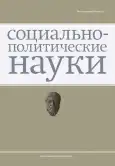Prerequisites for the emergence of the concept of hyperreality in the philosophy of postmodernism
- Authors: Goryachev A.Y.1
-
Affiliations:
- Elabuga Institute of Kazan Federal University
- Issue: Vol 13, No 2 (2023)
- Pages: 107-112
- Section: Social and Political Philosophy
- URL: https://journals.eco-vector.com/2223-0092/article/view/516502
- ID: 516502
Cite item
Abstract
The paper examines the historical and cultural environment of the period of development of postmodernist philosophy, making assumptions about the conditions for the emergence of the concept of hyperreality. The author attempts to summarize the historical and social preconditions that influenced the development of the idea of hyperreality in the second half of XX century. The analysis of the philosophical phenomenon of hyperreality is based on the key works of Jean Baudrillard. Hyperreality is interpreted as a special form of perception of reality in conditions of active transformation of symbolic images of the surrounding world. The philosophical concept of hyperreality is widely known in the context of Jean Baudrillard’s theory of simulation, but the socio-historical preconditions that necessitated the formulation of this concept are usually left out of the study. Considering the historical context of the formation of the philosophy of postmodernism, the author tries to summarize some of these preconditions. The task of the paper is to find interrelation between the appearance of new symbols in the human life and the distortion of the usual perception, perceived as hyperreality of what is going on. Conclusions. Most forms of augmented reality that we encounter today have the same signs of persistent distortion of perception as the postmodern hyperreality of the late twentieth century. J. Baudrillard’s concept can be extended to take into account modern elements of virtual interaction and be successfully applied to build theoretical models of the relationship between man and the surrounding world.
Keywords
Full Text
About the authors
Alexander Y. Goryachev
Elabuga Institute of Kazan Federal University
Author for correspondence.
Email: aleksgmail@mail.ru
ORCID iD: 0009-0002-6306-2164
PhD student at the Department of Philosophy and Sociology of the Elabuga Institute of the Kazan Federal University. Elabuga, Russian Federation.
Russian Federation, ElabugaReferences
- Baudrillard J. Conspiracy of art. The perfect crime. Transl. from French by A.V. Kachalov. Moscow: RIPOL Classic, 2021. 250 p.
- Baudrillard J. Symbolic exchange and death. 4th ed. Moscow: Dobrosvet; KDU Publishing House, 2011. 392 p.
- Baudrillard J. Simulacra and simulations. Transl. from French by A.V. Kachalov. Moscow: POSTUM Publishing House, 2015. 240 p.
- Goryacheva O. N. The construction of media reality with an agenda. University Herald. 2021. No. 9. Pp. 151–155. (In Rus.)
- Lectorsky V.A. Philosophy, cognition, culture. Moscow: Kanon+ ROOI “Rehabilitation”, 2012. 384 p.
- Pavlov A. B. Postpostmodernism: How social and cultural theories explain our time. Moscow: Publishing house “Delo” RANCHS, 2019. 560 p.
- Harvey D. State of the Postmodern. Exploring the origins of cultural change. Moscow: The Higher School of Economics Publishing House, 2021. 296 p.
- Chalmers D.J. Reality+: Virtual worlds and the problems of philosophy. NY: W.W. Norton & Company, 2022. 544 p.
- Goryacheva O.N., Kalinina G.S. The manipulative capacity of mass media. Humanities and Social Sciences Reviews. 2019. Vol. 7. No. 6. Pp. 491–494.
Supplementary files








